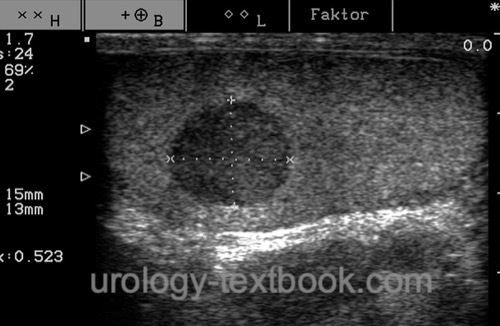You are here: Urology Textbook > Testes > Leydig-cell tumor
Leydig-Cell Tumor of the Testis
Definition
The Leydig-cell tumor is a hormone-producing stromal tumor of the testis with the proliferation of Leydig cells (Loy and Linke, 2003).
Epidemiology
1–3% of all testicular tumors, age peaks in childhood (5–10 years) and adults aged 30–60.
Pathology of the Leydig cell tumor
Small yellow-brown tumors, sharply circumscribed in the testicular tissue. Histologic evidence of malignancy includes necrosis, lymphatic vessel invasion, nuclear polymorphism, and increased mitotic activity, which are present in 10% of the cases.
| Do you want to see the illustration? Please support this website with a Steady membership. In return, you will get access to all images and eliminate the advertisements. Please note: some medical illustrations in urology can be disturbing, shocking, or disgusting for non-specialists. Click here for more information. |
Signs and Symptoms
- Nontender palpable testicular tumor
- Hormonal symptoms due to the production of testosterone are common: pubertas praecox, after puberty gynecomastia, erectile dysfunction, and decreased libido.
Diagnostic Workup
Laboratory tests
Hormone analysis :
Testosterone is often elevated and sometimes estrogen. LH and FSH tend to be suppressed. The following tests exclude (when normal) adrenal hormone production: 17-hydroxysteroid and 17-ketosteroid in urine, cortisone in plasma, ACTH stimulation, and dexamethasone suppression test.
Tumor marker of germ cell tumors:
Serum alpha-fetoprotein, beta human chorionic gonadotropin, and lactate dehydrogenase are within the normal range.
Ultrasound of the testes:
The typical finding in testicular ultrasound imaging is a well-circumscribed hypoechoic testicular mass.
 |
Staging:
If malignancy is possible, perform a CT scan of the chest and abdomen.
Treatment of Leydig Cell Tumor
Surgical treatment of the testicular tumor
Radical (inguinal) orchiectomy is often the initial treatment for larger tumors. Tumor enucleation and organ preservation is possible for small tumors or preoperative suspicion of a benign tumor, but the diagnosis should be confirmed with frozen section examination. If there are signs of malignancy or evidence of germ cell tumors on frozen section, radical orchiectomy should be performed.
Retroperitoneal lymphadenectomy:
(Laparoscopic) retroperitoneal lymphadenectomy should be offered if pathology shows clear signs of malignancy or if enlarged retroperitoneal lymph nodes are present.
Chemotherapy:
Chemotherapy for metastatic Leydig cell tumor; however, the response rates are low with cisplatin-containing combination regimens.
| Testicular epidermoid cyst | Index | Sertoli cell tumor |
Index: 1–9 A B C D E F G H I J K L M N O P Q R S T U V W X Y Z
References
Loy und Linke 2003 LOY, V. ; LINKE, J.:
[Endocrine tumors of the testis].
In: Pathologe
24 (2003), Nr. 4, S. 308–13
 Deutsche Version: Leydig-Zell Tumor des Hodens
Deutsche Version: Leydig-Zell Tumor des Hodens
Urology-Textbook.com – Choose the Ad-Free, Professional Resource
This website is designed for physicians and medical professionals. It presents diseases of the genital organs through detailed text and images. Some content may not be suitable for children or sensitive readers. Many illustrations are available exclusively to Steady members. Are you a physician and interested in supporting this project? Join Steady to unlock full access to all images and enjoy an ad-free experience. Try it free for 7 days—no obligation.
New release: The first edition of the Urology Textbook as an e-book—ideal for offline reading and quick reference. With over 1300 pages and hundreds of illustrations, it’s the perfect companion for residents and medical students. After your 7-day trial has ended, you will receive a download link for your exclusive e-book.